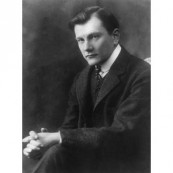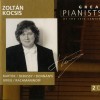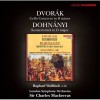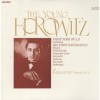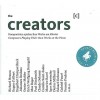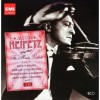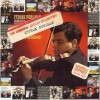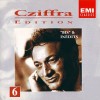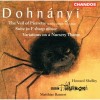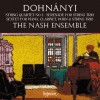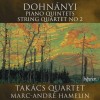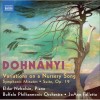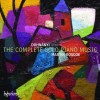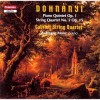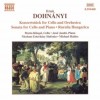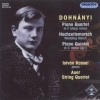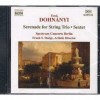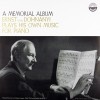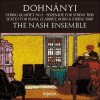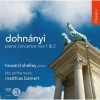传记
Ernő Dohnányi (pronounced [ˈɛrnø ˈdohnaːɲi]) (July 27, 1877 – February 9, 1960) was a Hungarian conductor, composer, and pianist. He used the German form of his name Ernst von Dohnányi for most of his published compositions.
The Dohnányi family was ennobled by Leopold I, Holy Roman Emperor and King of Hungary.
Dohnányi was born in Pozsony, Kingdom of Hungary, Austria-Hungarian Empire, (today Bratislava, capital of Slovakia). He first studied music with his father, a professor of mathematics and amateur cellist, at gymnasium, but afterwards became a pupil at the Budapest Academy of Music, studying piano and composition with Carl Forstner, organist of the Bratislava Cathedral. In 1894 he became a pupil of István Thomán for piano and of Hans von Koessler (a cousin of Max Reger) for composition. Béla Bartók was one of his classmates there. Dohnányi's first published composition, his Piano Quintet in C minor, earned the approval of Johannes Brahms, who promoted the work in Vienna.
After a few lessons with Eugen d'Albert, Dohnányi made his debut in Berlin in 1897 and was at once recognized as an artist of high attainments. Similar success in Vienna followed, and he then made the tour of Europe with the greatest success. He made his London debut at a Richter concert in the Queen's Hall, where he gave a memorable performance of Beethoven's Piano Concerto No. 4.
Using his position as a conductor, Dohnányi pioneered the performance of Bartók's more accessible music to boost its popularity.
During the following season, he visited the United States and established his reputation playing the Beethoven Piano Concerto No. 4 for his American debut with the Saint Louis Symphony Orchestra.
Unlike most other famous pianists of the time, Dohnányi did not limit himself to solo recitals and concerto solos, but also played chamber music.
Ernő married Elisabeth Kunwald, who was also a pianist. In 1902, their first son, Hans von Dohnányi, was born. Hans later distinguished himself as a leader of the anti-Nazi resistance in Germany and was a friend and collaborator of Dietrich Bonhoeffer (his brother-in-law). Hans in turn became the father of the well-known orchestral conductor, Christoph von Dohnányi.
Joseph Joachim invited Dohnányi to teach at the Hochschule in Berlin, which he did from 1905 to 1915. Going back to Budapest, Dohnányi organized over a hundred concerts there each year. In 1919, he was appointed director of the Budapest Academy, but was replaced the same year for purely political reasons. He became music director of the Budapest Philharmonic Orchestra and promoted the music of Bartók, Zoltán Kodály and other Hungarians, but did not play his own music very often. Dohnányi's pupils include Andor Földes, Ervin Nyíregyházi, Géza Anda, Annie Fischer, Edward Kilenyi, Bálint Vázsonyi, Sir Georg Solti, Istvan Kantor, Joseph Running, György/Georges Cziffra, Frank Cooper and Ľudovít Rajter.
In the 1920 season, he played the complete piano works of Beethoven. During the 1920s, he also recorded several of his works on the AMPICO reproducing piano.
In 1934 he was again appointed director of the Budapest Academy, a post he held until 1941, when he resigned from the post "as a protest against the anti-Jewish legislations [of that year]".[1] That year he also had to disband the Budapest Philharmonic Orchestra.
After World War II, which had claimed the lives of both of his sons, one in combat and the other executed by the Nazis for his role in a plot to assassinate Hitler, Dohnányi moved to the United States. He had remained in fascist Hungary during the war, using his influence and expending his own fortune to protect Jewish musicians. A whisper campaign against him was promoted by the new Communist government of Hungary, to the point where he found it necessary to leave. He was not able to revive his career as a concert pianist, but continued to compose and became interested in American folk music. His last orchestral work, American Rhapsody (1953), was written for the sesquicentennial of Ohio University and included folk material, for example, Turkey in the straw, On Top of Old Smokey and I am a poor wayfaring stranger. Dohnányi also taught for ten years at the Florida State University School of Music in Tallahassee. In 1946, he was initiated as an honorary member of the Epsilon Iota Chapter of Phi Mu Alpha Sinfonia Fraternity at the Florida State University.
His last public performance, on January 30, 1960, was at Florida State University, conducting the university orchestra in a performance of the Beethoven Piano Concerto No. 4 with his doctoral student, Edward R. Thaden, as soloist. Following this performance, Dohnányi traveled to New York City to record some Beethoven piano sonatas, as well as other works, on stereo LP discs for Everest Records. He had previously recorded a Mozart concerto, his own Variations on a Nursery Tune, the second movement of his Ruralia Hungarica (Gypsy Andante), and a few solo works (but no Beethoven sonatas) on 78 rpm and various works, including Beethoven's Tempest Sonata, on early mono LP discs. He died 10 days later, on February 9, 1960, of pneumonia in New York City. The BBC issued an LP recording taken from one of his last concerts with sonatas by Beethoven and Schubert, now considered one of the glories of the heritage of Romantic pianism.
He was buried in Tallahassee, Florida.
His 3 volumes of Daily Finger Exercises for the Advanced Pianist were published by Mills Music in 1962.
The Warren D. Allen Music Library at Florida State University's College of Music holds a large archive of Dohnányi's papers, manuscripts, and related materials.
The Hungarian government posthumously awarded him its highest civilian honor, the Kossuth Prize, in 1990.
An International Ernst von Dohnányi Festival was held at Florida State University in 2002





